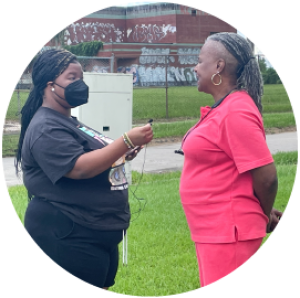
The Next Generation of Environmental Justice Leaders Tour Cancer Alley
Dec 2, 2022
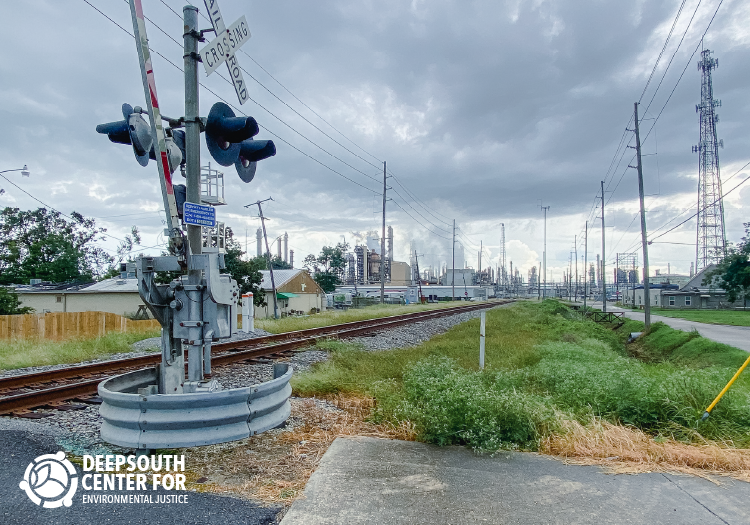
A fenceline community in Cancer Alley.
Four New Orleans high school students participating in the Deep South Center for Environmental Justice’s (DSCEJ) Environmental and Climate Justice Storyteller (ECJS) internship program completed a tour of Cancer Alley, an 85-mile stretch of land along the Mississippi River between Baton Rouge and New Orleans that is home to over 150 petrochemical plants and refineries. ECJS Interns, Langston Bishop, St. Augustine High School, Lael Tolbert, Mount Carmel High School, Re’Kal Hooker, The Living School, and Victoria Cager, New Orleans Center for Creative Arts met with community leaders throughout the corridor to learn more about the environmental injustices that have been occurring for decades in their own backyard.
Concerned Citizens of Gordon Plaza
New Orleans, LA
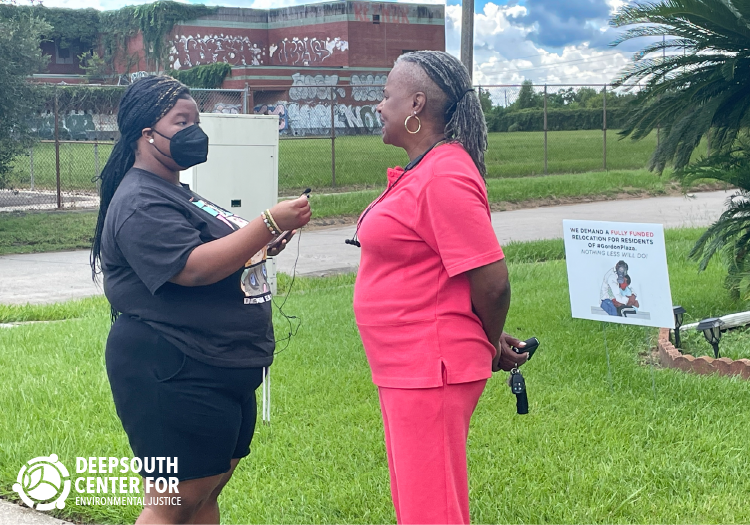
New Orleans ECJS Intern Re’Kal Hooker interviews Gordon Plaza Community Leader, Shannon Rainey
The students kicked off the Cancer Alley Tour in in the Gordon Plaza Community of New Orleans, LA, which sits on top of a municipal landfill. For forty years, residents in Gordon Plaza have complained of exposure to toxic waste in their yards, pipes corroding underneath their homes, and high rates of cancer in their community. Re’Kal Hooker interviewed community leader Shannon Rainey about her experience living in Gordon Plaza. Ms. Rainey spoke about the challenges she has experienced living in her community, such as seeing friends and neighbors succumb to cancer due to exposure to toxins in the soil. Although residents in this community have spent years in court fighting for relocation, many are hopeful that things may be different this time. Ms. Rainey said that “they are currently negotiating with the City of New Orleans for a fully funded relocation of residents living in Gordon Plaza.” She is hopeful and looks forward to a victory for the Gordon Plaza Community soon.
Citizens of St. John the Baptist Parish
Reserve, LA
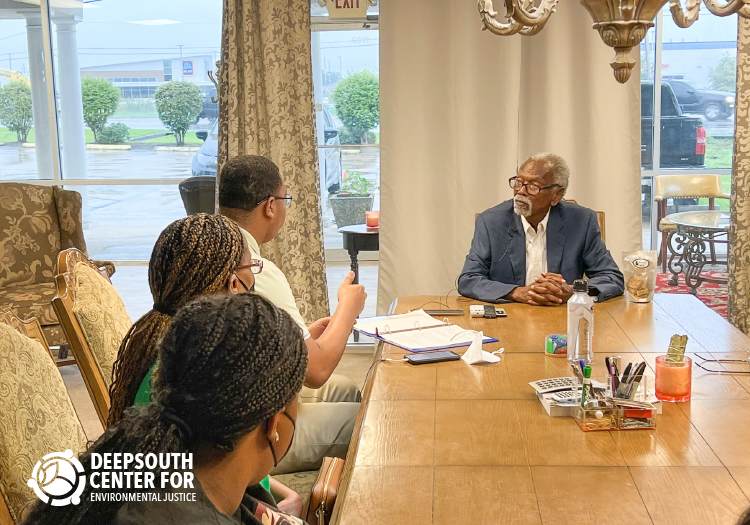
New Orleans ECJS Intern, Landon Bishop interviews St. John the Baptist Parish Community Leader, Robert Taylor.
The next stop on the Cancer Alley Tour was St. John The Baptist Parish in Reserve, LA, where the students met with community leader and President of Concerned Citizens of St. John the Baptist Parish Robert Taylor. During his interview conducted by Langston Bishop, we learned that Mr. Taylor started Concerned Citizens of St. John the Baptist Parish in 2016 after his wife became ill from exposure to toxic chemicals coming from the nearby Denka/Dupont Plant.
“The odors from the plant caused my wife to become extremely ill,” said Mr. Taylor. “After this incident, I reached out to the Environmental Protection Agency, Louisiana Department of Environmental Quality, and St. John Parish Homeland Security. I also reached out to local representatives from St. John the Baptist Parish and the local school board for help. The Fifth Ward Elementary School is only 1500 feet from Denka/Dupont.”
Mr. Taylor shared with Bishop that “Denka emits chloroprene levels over 400 times the Environmental Protection Agency safety standard for long term exposure,” which is why “it’s hard to find a family in Reserve, LA who hasn’t been touched by cancer.”
As a senior in his 80’s, Mr. Taylor’s advice to the next generation is to continue the fight for environmental justice with great allies.
“Unity is the key to fighting industry,” he said.
Rise St. James
St. James Parish
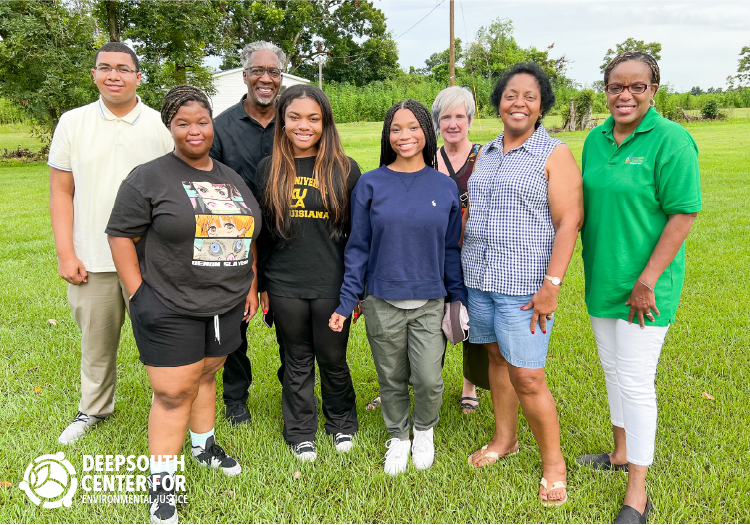 ECJS Team Leaders and New Orleans Interns from left to right: Landon Bishop, St. Augustine High School, Re’Kal Hooker, The Living School, Dr. John Warford, DSCEJ, Victoria Cager, New Orleans Center for Creative Arts, Dr. Deb Morrison, CLEAR Environmental, Sharon Lavigne, RISE St. James, and Mary I. Williams, DSCEJ
ECJS Team Leaders and New Orleans Interns from left to right: Landon Bishop, St. Augustine High School, Re’Kal Hooker, The Living School, Dr. John Warford, DSCEJ, Victoria Cager, New Orleans Center for Creative Arts, Dr. Deb Morrison, CLEAR Environmental, Sharon Lavigne, RISE St. James, and Mary I. Williams, DSCEJ
There are twelve plants on the West Bank and seven plants on the East Bank of St. James Parish. Additionally, Lavigne built storage plants next to homes in the community. As a result of the long-term exposure to toxic chemicals and high cancer rate in her community, Ms. Lavigne encourages the next generation to get their education and do their research so that they can come back to St. James Parish with ways to help their community. She would also like the federal government to declare a public health emergency in St. James Parish.Ms. Lavigne said, “the local officials don’t represent the community, they represent the industries. They have let us down.” Rise St. James has hosted town hall meetings and distributed flyers to raise awareness about plants coming into their community. Unfortunately, residential homes, the sugar mill, and St. James High School were sold to industry.
ECJS Interns look forward to continuing their work with these communities as they develop creative ways to chronicle their story as they demand the right to clean air, water, and soil for all.
About the Environmental and Climate Justice Storyteller Internship program
ECJS is a program funded by the National Academy of Sciences, Engineering and Medicine (NASEM). The $1.25 million, five-year grant awarded to the Deep South Center for Environmental Justice (DSCEJ) is dedicated to equipping the next generation of environmental and climate justice leaders with the technical skills to chronical the stories of marginalized communities along the Gulf Coast Region in LA, FL, MS, AL, and TX.